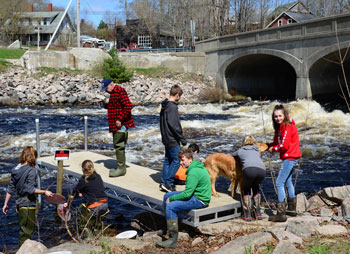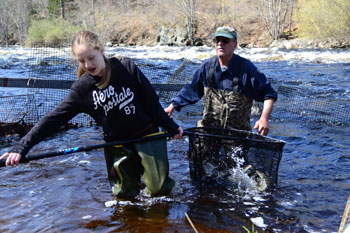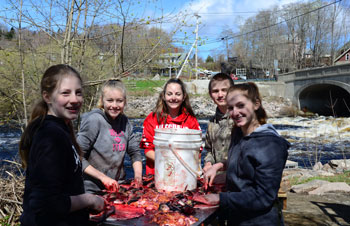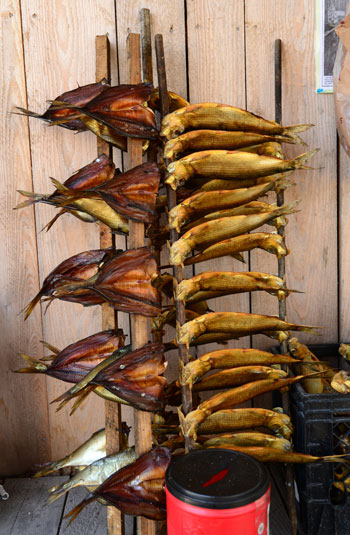Another Generation Dips Alewives on the East Machias
by Sarah Craighead Dedmon

Elm Street School Principal Tony Maker said the students love alewifing so much, they start asking if the alewives are running even before ice out. The students catch, split and smoke the fish and enjoy the constant company of Gary Ackley’s dog Cracker Jack. Photo by Sarah Craighead Dedmon.
It’s a bright spring morning in East Machias. The skies are blue, the leaves are just opening, the river is loud, and five young teenagers stand around a stainless steel table covered in blood and fish guts. They’re in high spirits — smiling and chatting as they move their blades by rote, then toss gutted alewives into a bucket.
Nearby a group of boys jump on and off of a dock in the river, splashing each other while they scrub blood and scales out of the buckets. They are followed everywhere by an exuberant golden retriever named Cracker Jack.
The students are working at the East Machias smokehouse, one of the last alewife smokehouses in Maine. For the past five years selectman Bucket Davis has operated the smokehouse on a special educational permit from the Maine Department of Marine Resources.
As far back as anyone can remember the town has had a smokehouse standing in the shadow of Pope’s bridge. Davis has been smoking fish there since the 1970s. “Used to be alewife stands all up and down the river,” he said. ““We dipped the alewives right there, sold them to lobster and halibut fishermen, and we smoked.” Davis worked alongside his father-in-law and his father-in-law’s friends.

Erin Otto carries a dipnet full of writhing alewives and East Machias Selectman Bucket Davis follows closely behind. Davis has smoked fish on the East Machias River since the 1970s. Photo by Sarah Craighead Dedmon.
Sometimes the men would sell the smoked fish to local grocery stores like the A&P and Mack MacKenzie’s. “We’d take ‘em right on the stick and set them on a shopping cart in the stores.”
“That was when you could legally sell them commercially,” he said. “Then the state got involved.”
At one time alewives were so thick in Maine rivers that farmers could let their pigs eat them straight out of the water. Their numbers have declined due to the usual suspects of dam construction, overfishing and pollution. But alewives are still plentiful in the East Machias. Every spring they enter the Machias Bay by the thousands and push their way up the river to spawn in freshwater.
For seventh and eighth grade students at Elm Street Elementary School, the spring alewife run is something they look forward to all year. “I love splitting,” said Phoebe Colbeth, using the term for cutting and cleaning out the alewives. “I always anticipate every year that I get to go split.”
“It’s kind of like riding a bicycle,” she said. “If you haven’t done it in a while but you’re used to doing it, it’s easy.”
Brooklyn Ferry prefers using the large dip nets to pull alewives out of the river, called “dipping.”
When all the fresh fish have been split and hung on sticks in the smokehouse, then it’s dipping time. Davis puts on his waders and goes waist deep into the river to close the gate on the trap. A lucky student is chosen to don waders and enters the river carrying the large, circular dip net. One pass and it’s an unruly mass of wriggling fish.
Children on the shore help wrangle the catch into a waiting crate, then they all wait for the catch to stop wriggling.

Seventh grade students from the Elm Street School in East Machias happily dive into splitting and kippering the alewives they just harvested from the river. From left to right: Erin Otto, Rachel Vose, Makenna Gardner, Demitri Colbeth, Kara Lyford. Photo by Sarah Craighead Dedmon.
Davis knows all of the children by name, and in many cases he knows their grandparents by name, too. He points to two dip nets hanging above the smokehouse door. “This young fella you’re talking to, those particular two nets was his great grandfather’s. And he probably didn’t know that.” Seventh grader Aiden Stewart shakes his head.
Davis remembers his reaction when the school principal called and asked him to involve the children in order to educate them on local history.
“I said, ‘Let’s try it. I don’t believe the kids will be interested,’” said Davis. “I was wrong.”
Every day a handful of local men can be found along the river helping the children, the fish and the visitors. Will Tuell, Pat Ward and Gary Ackley are all from East Machias. Cracker Jack belongs to Ackley, and a black and white picture of Ackley’s father hangs on the smokehouse wall above a donation can. The fish are free, but donations go to support the eighth grade field trip to Boston.
Davis fixed up an old deacon’s bench he saved from the trash heap when the town remodeled an office. Now it sits along the river, offering a place to sit for some of the older people who like to be near the smokehouse activity.
“When the kids are splitting like they are this morning, the older people will come down, take that roe and they take it home, clean it up, roll it in flour and fry it up in bacon grease or something like that,” said Davis. “We call that Downeast bubblegum.”
When the older generation can’t come to the smokehouse, Davis and the children take the alewives to them. One day the children carried coolers off their bus and into the Maine Veterans’ Home in Machias. Davis set up a grill in the courtyard while the children set to work wrapping the fish in foil and shuttling them to the grill and off again. Another group stood side by side at the kitchen island, painstakingly sorting fish from bones for the elderly residents who needed them deboned.

The seventh and eighth grade students prepare the alewives kippered or “in the round.” Ackley said young people prefer them kippered, but the older people like them in the round because they still have the roe inside. Photo by Sarah Craighead Dedmon.
Eighth grader Hannah Maker was there. She said alewife season is something she looks forward to all year long, even stashing alewifing clothes in her locker before the fish begin to run, just so she’ll be ready. “I think it’s very fun. It’s part of Downeast, so it’s good they have it,” said Maker. She doesn’t eat the fish, but she likes the fishing. She’s very good at it.
When the fish have stopped running, there’s still one more alewife event the children look forward to. For the past four years Davis has chosen King and Queen Alewife, an honor awarded during the school’s eighth grade graduation ceremony. Davis said he got the idea from the old sardine smokehouse companies, once major employers in the area.
In his coronation speech school Principal Tony Maker said the children love alewifing so much, they start peppering him with questions even before ice out. It becomes an alewifing version of “Are we there yet?” Then, one happy day Davis calls to say the river is full of seals and the cormorants are everywhere. It’s time.
The children know they can only go to the river if they’re caught up on their schoolwork, and if they make up the schoolwork they miss. Davis can only take between eight and 12 at a time. “Every morning I’d come into school and they’d say, ‘Gonna be my turn? Gonna be my turn?’” said Davis.
This year’s group of students were the most capable alewifers yet. “They could split 300 fish in just an hour’s time. Just amazing,” said Davis. “We actually ran two smokehouses trying to keep up on the requests. People would come from everywhere.”
Colby Gardner and Hannah Maker are crowned King and Queen Alewife 2018. They each receive a crown, a sceptre, and bag of dog treats to share with Cracker Jack.
“[The kids] spend a lot of time on the river learning the traditions of bygone days and preserving those for future generations,” said principal Maker.
“They also provide a memory, something people grew up eating that they forgot was there until they had a chance to have those again.”
“And the smiles on the peoples’ faces when they come in,” said Maker.
